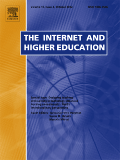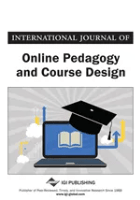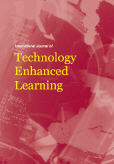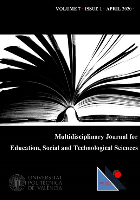
Online Learning
Scope & Guideline
Exploring the Frontiers of Virtual Learning
Introduction
Aims and Scopes
- Innovative Pedagogical Strategies:
The journal emphasizes the exploration and evaluation of new teaching methods and frameworks that enhance learning experiences in online environments. - Technology Integration in Education:
A core focus is on how various technological tools and platforms can be effectively integrated into online learning to facilitate engagement and improve educational outcomes. - Learner Engagement and Experience:
Research on student perceptions, engagement strategies, and the overall learning experience in online settings is a significant aspect of the journal's content. - Equity and Accessibility in Online Learning:
The journal addresses issues of inclusivity and equitable access to online education, particularly for underrepresented and marginalized student populations. - Assessment and Evaluation in Online Education:
The journal explores best practices for assessing student learning and satisfaction in online courses, including innovative assessment methods and feedback mechanisms. - Community and Collaboration:
Research on building community, collaboration, and social presence among online learners is a consistent theme, highlighting the importance of interpersonal connections in virtual learning.
Trending and Emerging
- Artificial Intelligence in Education:
A significant increase in research related to the integration of AI tools, such as ChatGPT and generative AI, into online teaching and learning practices is evident, reflecting the growing interest in leveraging AI for educational enhancement. - Impact of the COVID-19 Pandemic:
Research focusing on the effects of the pandemic on online learning, including the transition to remote instruction and the unique challenges faced by students and educators, has become a prominent theme. - Mental Health and Well-Being in Online Learning:
Emerging studies are increasingly addressing the mental health challenges associated with online learning, highlighting the need for supportive measures and interventions for students. - Inclusive and Culturally Responsive Teaching:
There is a growing emphasis on culturally responsive pedagogical practices and inclusive strategies to support diverse student populations in online environments. - Community Building and Social Presence:
Research on fostering community and social presence among online learners is trending, as educators seek to enhance engagement and collaboration in virtual classrooms. - Self-Regulated Learning and Learner Autonomy:
An increasing focus on self-regulated learning strategies and fostering learner autonomy in online education highlights the importance of equipping students with skills for independent learning.
Declining or Waning
- Traditional Learning Theories:
There has been a noticeable decrease in research centered on traditional learning theories in the context of online education, as newer frameworks like Community of Inquiry gain traction. - Face-to-Face Instruction Comparisons:
Studies comparing online learning outcomes with traditional face-to-face instruction are becoming less frequent, possibly due to the increasing acceptance and normalization of online learning modalities. - General Technology Use Without Pedagogical Context:
Research focusing solely on the use of technology in education without a pedagogical lens is declining, as the field moves towards understanding the interplay between technology and effective teaching practices.
Similar Journals

Journal of E-Learning and Knowledge Society
Unlocking Insights for Tomorrow's Digital EducatorsJournal of E-Learning and Knowledge Society is a premier academic journal dedicated to the exploration and advancement of e-learning and knowledge dissemination in contemporary society. Published by the SOC ITALIANA E-LEARNING, this journal has established itself as a vital resource for researchers and practitioners since its inception in 2006. With an open access model adopted in 2007, the journal promotes the free exchange of ideas and research findings, ensuring wide accessibility to academic contributions in this rapidly evolving field. The journal is indexed in notable databases and holds a Q3 classification in both Computer Science Applications and Education, reflecting its significant role in the advancement of educational technologies. Furthermore, its Scopus ranks highlight its relevance within the educational and computer science communities. Based in Rome, Italy, the Journal of E-Learning and Knowledge Society aims to bridge the gap between theory and practice, providing a platform for innovative research that shapes the future of digital learning environments. Whether you are a researcher, educator, or student, this journal offers valuable insights and developments in e-learning that are critical to navigating today’s knowledge society.

Internet and Higher Education
Exploring the Future of Learning in a Connected WorldWelcome to Internet and Higher Education, a premier journal published by Elsevier Science Inc, focusing on the dynamic intersection of technology and education. Established in 1998, this journal provides a platform for innovative research and critical discussions in the fields of Computer Networks and Communications, Computer Science Applications, and E-learning, consistently ranked in the Q1 quartile across multiple categories in 2023. With an impressive Scopus ranking placing it in the top 1% of Social Sciences and Computer Science categories, Internet and Higher Education aims to foster interdisciplinary collaboration and advance our understanding of digital learning environments. The journal invites contributions that explore the impact of the internet on higher education, offering tangible insights for educators, administrators, and policymakers alike. Stay updated on the latest findings and trends that are shaping the future of education through technology.

International Journal of Online Pedagogy and Course Design
Connecting theory and practice in online pedagogy.The International Journal of Online Pedagogy and Course Design, published by IGI Global, serves as a vital resource for researchers, educators, and practitioners interested in the integration of technology in education. Since its inception in 2017, this journal has focused on the latest advancements in online teaching methodologies, course design, and assessment frameworks, contributing to the dynamic field of educational technology. It is indexed in Scopus and currently ranks Q4 in the Education category, reflecting its growing influence within the academic community. The journal provides an invaluable platform for sharing innovative research and practical insights that enhance online learning experiences, crucial in today’s digitally-driven educational landscape. With an ISSN of 2155-6873 and E-ISSN of 2155-6881, the journal is dedicated to fostering a collaborative environment where ideas and practices in online pedagogy can thrive.

Electronic Journal of e-Learning
Pioneering Insights in e-Learning and Educational TechnologiesElectronic Journal of e-Learning is a prominent peer-reviewed publication dedicated to the exploration and dissemination of advancements in the fields of e-learning, computer science applications, and educational technologies. Published by ACAD CONFERENCES & PUBL INT LTD since 2003 as an open-access journal, it facilitates the free exchange of knowledge, ensuring researchers, educators, and practitioners have unrestricted access to cutting-edge research and innovative practices. With an impressive impact factor reflecting its influence, the journal has achieved a Q2 ranking in both Computer Science Applications and Education for 2023, placing it among the top-tier journals in its field. The Electronic Journal of e-Learning serves as a crucial platform for scholarly discussions, helping to shape the future of educational practices and technology integration. As it converges from 2011 to 2024, the journal continues to invite submissions that advance the understanding and application of e-learning strategies across varied educational contexts.

African Journal of Health Professions Education
Innovating Health Education for a Healthier AfricaAfrican Journal of Health Professions Education (ISSN: 2078-5127, E-ISSN: 2078-5127), published by HEALTH & MEDICAL PUBLISHING GROUP, is a premier open access journal dedicated to advancing the field of health professions education across Africa and beyond. Launched in 2009, this journal provides a platform for sharing innovative research, pedagogical practices, and policy developments that enhance educational methodologies in healthcare-related disciplines. With its commitment to accessibility, the journal facilitates the dissemination of knowledge to researchers, practitioners, and students alike, thereby contributing significantly to the improvement of health outcomes through effective education. The journal's scope encompasses various areas, including curriculum development, assessment strategies, and the integration of technology in health professions education, making it an invaluable resource for anyone engaged in health education research and practice.

International Journal of Education in Mathematics Science and Technology
Inspiring excellence in mathematics and science education worldwide.The International Journal of Education in Mathematics Science and Technology (ISSN: 2147-611X, E-ISSN: 2147-611X) is an esteemed publication dedicated to advancing knowledge and research in the fields of mathematics, science, and technology education. Published by Necmettin Erbakan University in Turkey, this journal serves as a vital platform for educators, researchers, and professionals to disseminate innovative methodologies, pedagogical strategies, and educational technologies. With a commendable Q2 ranking in both the Education and Mathematics categories for the year 2022, it clearly exemplifies its impact in these domains, boasting a Scopus rank of #19 out of 74 in Mathematics (miscellaneous) and a position in the 75th percentile. Although the journal has transitioned into open access, it remains committed to fostering a rich dialogue among scholars and practitioners dedicated to enhancing educational outcomes in mathematics and science. Researchers and educators interested in contributing to pedagogical advancements are encouraged to submit their work, thereby playing a part in influencing the future of education.

International Journal of Technology Enhanced Learning
Advancing the Future of Learning through TechnologyInternational Journal of Technology Enhanced Learning, published by INDERSCIENCE ENTERPRISES LTD, is a premier scholarly journal that comprehensively explores the intersection of technology and education, fostering innovative approaches to enhance learning processes. Established in 2008 and continuing through 2024, the journal is pivotal for researchers, educators, and technology professionals aiming to disseminate and engage with cutting-edge developments in technology-enhanced learning environments. With an admirable ranking in Scopus—placing in the 72nd percentile of Education and 49th in Computer Science Applications—the journal reflects a robust influence in the fields of Computer Science Applications and Education, as evidenced by its Q2 and Q3 quartile rankings. The journal not only provides a platform for empirical research and theoretical discourse but also emphasizes practical implementations in e-learning. Although it does not offer open access, its curated collection of articles serves as a vital resource for scholars and practitioners who are dedicated to advancing the nexus of technology and education.

International Journal of Mathematical Education in Science and Technology
Advancing Knowledge in Mathematical Education and TechnologyThe International Journal of Mathematical Education in Science and Technology, published by TAYLOR & FRANCIS LTD, is a leading academic journal dedicated to the interdisciplinary field of mathematical education, emphasizing the integration of science and technology. With an ISSN of 0020-739X and E-ISSN 1464-5211, the journal serves as a vital resource for researchers, educators, and practitioners seeking innovative methodologies and pedagogical frameworks in mathematics education. As of 2023, it has achieved a prestigious standing in Q2 quartiles across three categories: Applied Mathematics, Education, and Mathematics (miscellaneous), with notable rankings in Scopus, including 16th in Mathematics and 486th in Social Sciences Education. The journal, which has been converging its research and findings since 1970 and will continue to do so until 2024, is not available as an open access publication, but offers a wealth of insights for those committed to enhancing mathematical understanding in various educational contexts. Its emphasis on cutting-edge research makes it a crucial conduit for advancements in both theoretical and practical aspects of mathematics education.

Multidisciplinary Journal for Education Social and Technological Sciences
Empowering Voices in Education and TechnologyThe Multidisciplinary Journal for Education Social and Technological Sciences, published by UNIV POLITECNICA VALENCIA, EDITORIAL UPV, stands at the forefront of interdisciplinary research, bridging the fields of education, social sciences, and technological advancements. With its commitment to Open Access publishing since 2014, this journal provides an invaluable platform for researchers, professionals, and students to disseminate their findings and engage in scholarly dialogue. The journal boasts an ISSN of 2341-2593, ensuring the integrity and longevity of its contributions. Designed to foster innovative thinking and collaboration across diverse disciplines, it invites contributions that address pressing educational challenges and technological innovations. Whether you are seeking to enhance your academic portfolio or stay abreast of the latest research trends, this journal serves as a vital resource in the evolving landscape of education and technology. Located in the vibrant city of Valencia, Spain, it positions itself as a key player in the European academic scenario, encouraging submissions that represent the rich tapestry of global research.

Journal of University Teaching and Learning Practice
Championing Best Practices in University EducationWelcome to the Journal of University Teaching and Learning Practice, a premier publication dedicated to advancing research and practice in higher education. Published by UNIV WOLLONGONG, this journal provides a vital platform for educators, researchers, and practitioners to explore innovative teaching methodologies and learning strategies to enhance the university experience. With an impressive impact factor and categorized in the Q2 quartile for Education in 2023, this journal ranks in the top percentile of educational research, boasting a Scopus rank of 437 out of 1543 in Social Sciences Education. Since its inception in 2016, the journal has become a significant contributor to the field, fostering a scholarly dialogue among scholars from around the globe. Although currently not operating under an Open Access model, it offers valuable insights and is committed to publishing high-quality research that reflects best practices in educational settings. Join our community of academics dedicated to transforming university teaching and learning through rigorous scholarship and innovative practices.